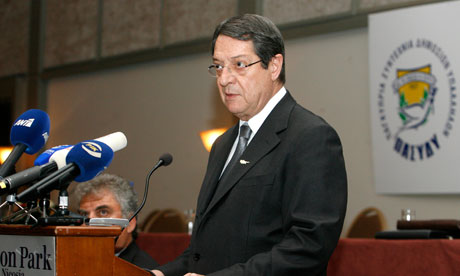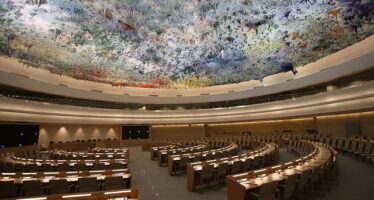Cyprus will not leave the euro, says President Nicos Anastasiades
![]()
Cypriots and eurozone told threat of bankruptcy lifted for now and bank restrictions will be eased eventually
Reuters in Nicosia

Cyprus’s President Nicos Anastasiades at a press conference in Nicosia. Photograph: Philippos Christou/AP
The president of Cyprus said on Friday that the risk of bankruptcy had been contained and the country had no intention of leaving the euro.
In a speech laden with criticism of Europe’s currency union for experimenting with the island’s fate, Conservative leader Nicos Anastasiades spoke a day after banks reopened following an almost two-week shutdown to avert a run on deposits by worried Cypriots and wealthy foreign depositors.
Anastasiades said restrictions imposed on bank transactions in Cyprus – unprecedented in the currency bloc since euro coins and banknotes entered circulation in 2002 – would be gradually lifted. But he gave no timeframe.
Cyprus’s difficulties have sent jitters around the fragile single European currency zone, and the imposition of capital controls has led economists to warn that a second-class Cyprus euro could emerge, with funds trapped on the island worth less than euros that can be freely spent abroad.
In a speech to civil servants in the capital, Nicosia, Anastasiades hit out at banking authorities in Cyprus and Europe for pouring money into a crippled Cypriot bank that now faces closure under the terms of the €10bn (£8.4bn) bailout plan that averted the immediate risk of financial meltdown.
“How serious were those authorities that permitted the financing of a bankrupt bank to the highest possible amount?” Anastasiades said.
“I don’t want to say more,” he added. “Now is not the time to say who bears more or less of the blame.”
Anastasiades clinched the last-ditch bailout in Brussels five days ago, but has faced a backlash from Cypriots angry at the price that came with it – the winding down of the island’s second-largest bank, Cyprus Popular Bank or Laiki, and an unprecedented raid on deposits over €100,000 that could spell the end of Cyprus as a hub for offshore finance. The country faces steep job losses and a prolonged and deep recession.
The president, barely a month in the job and wrestling with Cyprus’s worst crisis since a 1974 war split the island in two, accused the 17-nation euro currency bloc of making “unprecedented demands that forced Cyprus to become an experiment”. But he added: “We have no intention of leaving the euro. In no way will we experiment with the future of our country.”
European leaders have insisted the raid on big bank deposits in Cyprus is a one-off in their handling of a debt crisis that refuses to be contained.
But policymakers are divided, and the waters were muddied a day after the deal was inked when the Dutch chair of the eurozone’s finance ministers, Jeroen Dijsselbloem, said it would serve as a model for the handling of future crises.
Faced with a market backlash, Dijsselbloem rowed back. But on Friday European Central Bank governing council member Klaas Knot, a fellow Dutchman, said there was little wrong with his assessment.
“The content of his remarks comes down to an approach which has been on the table for a longer time in Europe,” Knot was quoted as saying by Dutch daily Het Financieele Dagblad. “This approach will be part of the European liquidation policy,” he said, in comments a spokesman said were accurately reported.
The government initially said the controls would stay in place for seven days, but foreign minister Ioannis Kasoulides said on Thursday they could last about a month.
Economists warn it could be much longer before confidence in the Cypriot economy bounces back enough to lift the restrictions.
Related Articles
La elección de Argentina, Honduras y Paraguay en el Consejo de Derechos Humanos de Naciones Unidas: breves apuntes
![]()
El pasado 14 de octubre se realizó la elección, en el seno de la Asamblea General de Naciones Unidas, de los nuevos integrantes del Consejo de Derechos Humanos
The Virtue of Chelsea Manning
![]()
A History of the Vanquished “Mr. Manning’s treatment has been intended to send a signal to people of conscience in
Ella: Cristina
![]()
¿A quién le cabe duda de que la Argentina –sociedad más instituciones– configura un dispositivo mayoritariamente patriarcal? Heteropatriarcal: patriarcado que



